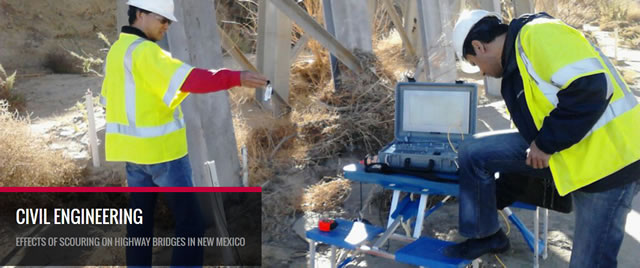
Civil Engineering ETDs
Publication Date
Spring 5-11-2019
Abstract
This thesis presents a study performed to validate the State-based Peridynamic Lattice Model (SPLM) using results obtained from laboratory experiments. The SPLM is capable of modeling cracking of solids using particle lattices. We use a plane stress, elastic-plastic damage SPLM model for the simulations. The SPLM model is appropriate for computational simulations of cementitious materials as it automatically allows cracks to develop. In this study, the lattices are rotated through different angles and the variations of the cracking patterns are studied. In the laboratory, we performed nine Brazilian split cylinder tests, three anchor pullout/direct tensile tests, and eight compression tests on cylinders of standard size. We also tested four beams as modulus of rupture tests. The results from the laboratory tests and the SPLM simulations were then compared. The comparison indicates that the SPLM produced similar results as the laboratory experiments and the ACI code predictions. These results indicate that SPLM is a reasonable simulation method for these types of specimens.
Keywords
SPLM, peridynamic, plane stress, crack, damage, plasticity.
Document Type
Thesis
Language
English
Degree Name
Civil Engineering
Level of Degree
Masters
Department Name
Civil Engineering
First Committee Member (Chair)
Walter Gerstle
Second Committee Member
Timothy Ross
Third Committee Member
Fernando Moreu
Recommended Citation
Bista, Anima. "VALIDATION OF THE STATE BASED PERIDYNAMIC LATTICE MODEL." (2019). https://digitalrepository.unm.edu/ce_etds/222
